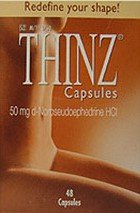The Rise and Fall of Thinz Original Diet Pills
Thinz Original Diet Pills once held a prominent position in the world of weight loss solutions. Marketed for their efficacy in aiding weight reduction, they were favored for their potent formulation, particularly the active ingredient, d-Norpseudoephedrine Hydrochloride. This compound, an amphetamine, was celebrated for its multiple benefits, including appetite suppression, increased energy levels, and mood elevation. However, the same characteristics that made Thinz so effective also led to their downfall due to severe health risks and regulatory issues.
The Appeal of Thinz
The primary allure of Thinz Original Diet Pills lay in their robust mechanism of action. d-Norpseudoephedrine Hydrochloride worked by stimulating the central nervous system, which resulted in reduced hunger pangs and a boost in energy. For many, this meant a significant reduction in caloric intake without the struggle of persistent hunger, coupled with enhanced energy to support physical activity. These benefits combined to facilitate rapid and effective weight loss, making Thinz a popular choice among dieters.
Mechanism of Action
The amphetamine-like properties of d-Norpseudoephedrine Hydrochloride were key to its effectiveness. By increasing the release of norepinephrine and dopamine, the pills promoted a sense of well-being and alertness, which not only helped individuals adhere to their diet plans but also improved their overall mood. This neurochemical boost was particularly beneficial for those who struggled with the emotional aspects of dieting, such as cravings and stress eating.
Side Effects and Health Risks
Despite their efficacy, Thinz Original Diet Pills were not without significant drawbacks. The potent stimulant effects of d-Norpseudoephedrine Hydrochloride came with a high risk of adverse side effects. Common issues reported by users included increased heart rate, elevated blood pressure, and insomnia. More severe health risks included the potential for heart attacks, strokes, and other cardiovascular problems. The amphetamine-like nature of the ingredient also posed a risk of addiction and dependency.
Regulatory Actions and the Ban
The health risks associated with Thinz did not go unnoticed by regulatory authorities. As reports of serious side effects and health complications grew, health organizations and regulatory bodies around the world began to scrutinize the safety of these diet pills. The risks were deemed too significant, leading to the eventual ban of Thinz Original Diet Pills in many countries. The ingredient d-Norpseudoephedrine Hydrochloride was also targeted due to its potential misuse in the illegal production of methamphetamines.
The Aftermath and Alternatives
Following the ban, Thinz Original Diet Pills were removed from the market, leaving many former users searching for alternative weight loss solutions. In response, the market saw an influx of herbal and natural diet pills. One such alternative is Alcachofra, derived from artichoke extract. While these herbal supplements are marketed as safer options, they generally lack the potency and rapid results that Thinz provided. Users often find that while these alternatives may support weight loss efforts, they do not offer the same level of appetite suppression and energy boost.
Reflection on Efficacy and Safety
The story of Thinz Original Diet Pills serves as a cautionary tale in the realm of weight loss supplements. While the promise of quick and effective weight loss is appealing, it is crucial to consider the safety and long-term health implications of such products. The balance between efficacy and safety must be carefully managed, and consumers should be wary of supplements that deliver dramatic results through potent pharmacological means.
In conclusion, Thinz Original Diet Pills remain a notable example of the challenges and risks associated with weight loss drugs. Their initial popularity underscored the demand for effective weight loss solutions, but their eventual ban highlighted the importance of safety and regulatory oversight. For those seeking weight loss assistance, it is advisable to opt for solutions that prioritize health and well-being, even if they may not offer the same rapid results as Thinz once did.





